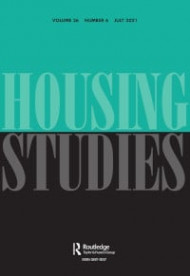‘Homeless’ people are usually considered as citizens without property. The absence of ownership, especially in terms of housing, co-creates the very idea of homelessness in current societies. Despite this fact, ‘homeless’ citizens negotiate and experience their property, things, or the shelter in which they dwell. This paper sheds light on how this property is negotiated and experienced and how it influences home-making. It does so by drawing on long-term ethnographic research in the city of Pilsen, a second-order city in Czechia. Based on the intra-urban comparison of informal dwelling in two abandoned buildings – a former railway station tower and an allotment cottage – the paper conceptualize the unspotted home and argues that it arises from the assemblage of socio-materiality, meanings, and various dimensions of politics, where the politics of home-ownership has an important position. While informal ownership here is related to power asymmetry within home-making, paradoxically, it also brings about more complex informal citizenship and the potential for political action.
impaktovaný článek
Vašát, Petr
From squat to cottage: materiality, informal ownership, and the politics of unspotted homes
Vašát, Petr. 2021. „From squat to cottage: materiality, informal ownership, and the politics of unspotted homes.“ Housing Studies (online first), https://doi.org/10.1080/02673037.2021.1966393. Dostupné z: https://www.tandfonline.com/eprint/PBA438PJZQG5SJFHZNBU/full?target=10.1080/02673037.2021.1966393.
Autoři:
Oddělení:
Témata:
bydlení
město a vesnice
metodologie výzkumu
mezilidské vztahy
sociální nerovnosti
sociologická teorie


Facebook
Twitter
Tweets by SociologickyNewsletter